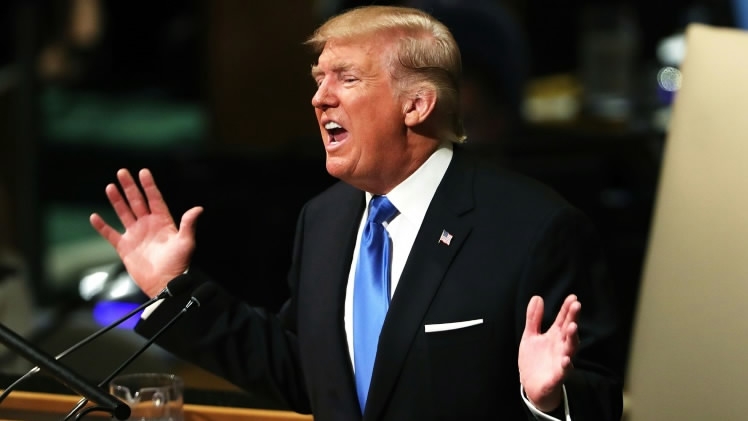US President Donald Trump is expected to declare the
Iran deal, also known as the Joint Comprehensive Plan of Action (JCPOA), to no longer be in the US national interest in a speech on Friday at 12:45 p.m. local time (16:45 GMT).
However, due to pressure at home and abroad not to withdraw from the deal outright, Trump is not expected to call for fresh sanctions that would kill off the accord.
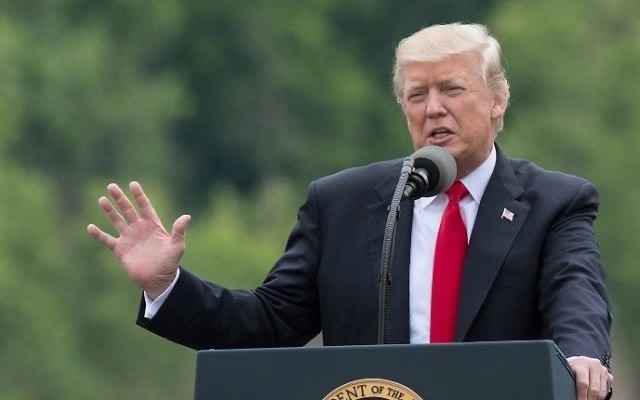
US President Donald Trump speaks in Cincinnati, Ohio, on June 7, 2017. /AFP Photo
US President Donald Trump speaks in Cincinnati, Ohio, on June 7, 2017. /AFP Photo
If Trump withdraws his backing for the agreement - a move known as "decertification" - the ball would be kicked to US lawmakers. The US Congress would have 60 days to decide if the US should re-impose sanctions against Iran, which were suspended in 2015 as part of the agreement.
Why is Trump making the decision now?
The US president is bound by law to recertify Iran's compliance with the accord every 90 days, and October 15 is Trump's deadline to send the new decision to Congress.
Trump pledged to scrap the deal during his presidential campaign, and is known to have been frustrated at being forced to recertify it twice earlier in his presidency. He warned in July that he would not continue to do so indefinitely.
The Washington Post reported on Wednesday that Trump "threw a fit" in mid-July when Secretary of State Rex Tillerson and Defense Secretary Jim Mattis argued that he should recertify the deal because it offered stability and wider benefits to the US.
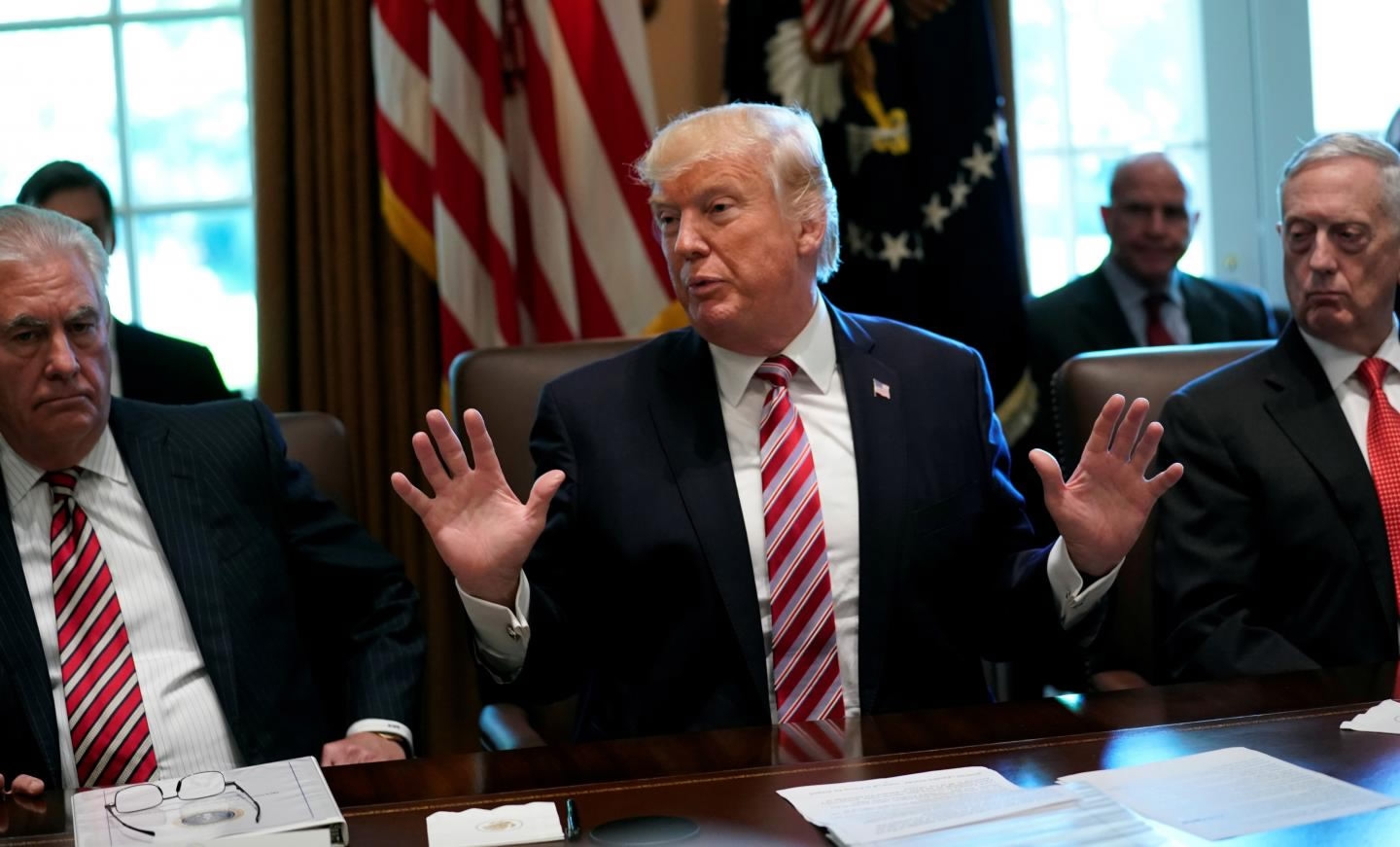
US Secretary of State Rex Tillerson and Secretary of Defense James Mattis flank President Donald Trump as he meets with his Cabinet at the White House in Washington, DC, on June 12, 2017. /Reuters Photo
US Secretary of State Rex Tillerson and Secretary of Defense James Mattis flank President Donald Trump as he meets with his Cabinet at the White House in Washington, DC, on June 12, 2017. /Reuters Photo
Trump’s frustration led National Security Advisor H.R. McMaster to seek out alternative options for the next deadline, including a compromise that would allow Trump to reject the deal without killing it.
Why does Trump hate the deal?
Trump has twice formally acknowledged that Iran is abiding with the terms of the deal and recertified the agreement, but has repeatedly denounced it as the "worst deal ever negotiated."
He has claimed Iran is not cooperating with the spirit of the agreement, and accused Tehran of destabilizing the Middle East by testing missiles, as well as funding and backing terrorist groups in Yemen and Syria.
Some analysts question whether Trump understands the terms and consequences of the deal. Emma Ashford and John Glaser, two scholars from Cato Institute, asserted the president was following the hardline rhetoric of Iran hawks, whose goal is to get rid of Iran's entire nuclear program.
Trump has said he cannot allow the agreement to provide cover for the eventual construction of a nuclear program, but Ashford and Glaser pointed out the deal is used to restrict an existing program so that it is not used to develop nuclear weapons.
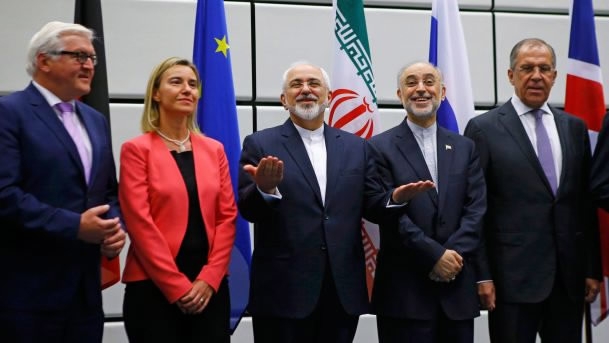
File photo: German Minister Frank-Walter Steinmeier, Federica Mogherini, Mohammad Javad Zarif, Iranian ambassador to IAEA Ali Akbar Salehi and Russian Foreign Minister Sergey Lavrov (L-R) in Vienna, on July 14, 2015. /Reuters Photo
File photo: German Minister Frank-Walter Steinmeier, Federica Mogherini, Mohammad Javad Zarif, Iranian ambassador to IAEA Ali Akbar Salehi and Russian Foreign Minister Sergey Lavrov (L-R) in Vienna, on July 14, 2015. /Reuters Photo
Iran is unwilling to abandon its nuclear program, so it's impossible for Trump or Iran hawks to reach a deal with Iran to cease its entire nuclear program.
Eli Lake, a Bloomberg View columnist, suggested Trump was aiming to spite another of predecessor Barack Obama's signature foreign policy achievements.
Obama's administration helped negotiate the Trans-Pacific Partnership, but Trump said the US would not be a part of it. Obama also signed up to the Paris climate deal, but Trump withdrew. And the new president argued against Obama’s plan to accept more Syrian refugees.
‘Voice of stay’ inside the White House
Debate over the Iran deal is believed to have been fierce inside the Trump administration, with Iran hawks urging confrontation and others, including Defense Secretary Jim Mattis, arguing that the existing nuclear deal must be upheld.

US Secretary of Defense Jim Mattis holds a press briefing at the Pentagon on May 19, 2017. /AFP Photo
US Secretary of Defense Jim Mattis holds a press briefing at the Pentagon on May 19, 2017. /AFP Photo
Mattis views appear sharply at odds with Trump's assessment. He supported the 2015 deal, saying Iran "is living by the agreement, if we can determine that this is in our best interest, then surely we should stay with it."
"I believe at this point in time, absent indication to the contrary, it is something that the president should consider staying with," he told the Senate Armed Services Committee.
According to Andrew Beatty, AFP's White House correspondent, some in Trump's administration also agreed it's not the time to withdraw from the deal as the US is experiencing an escalating nuclear stand-off with the Democratic People's Republic of Korea (DPRK).
Others in Trump's administration also warned of irritating countries in the Middle East and voiced concerns that ties with the EU could also be damaged given the strong support for the deal from France, Germany and Britain.
'No renegotiation' say other signatories
Trump’s decertification would not necessarily lead to the end of the deal, but would likely result in a push for renegotiation with tougher terms.

Iranian President Hassan Rouhani addresses the 72nd United Nations General Assembly at UN headquarters in New York, US, on September 20, 2017. /Reuters Photo
Iranian President Hassan Rouhani addresses the 72nd United Nations General Assembly at UN headquarters in New York, US, on September 20, 2017. /Reuters Photo
Appetite for renegotiation outside the US is low, however. Iran and the other signatories -- China, Russia, France, Britain and Germany -- all defend the deal as a guarantee of the peaceful, non-military purposes of Tehran's nuclear program.
Iranian President Hassan Rouhani has repeatedly lashed out at Trump, saying the US president was opposing "the whole world" by trying to abandon the nuclear deal.
“No one can reverse them (the nuclear talks + JCPOA), neither Mr. Trump nor anyone else,” he stated in a ceremony at Tehran University on October 7.
Chinese Foreign Minister Wang Yi, speaking at a meeting of Foreign Ministers of the Six Countries and Iran at the UN headquarters in New York on September 20, said the JCPOA has defused a potential crisis over Iranian nuclear ambitions, and the agreement is an important outcome of international security governance.
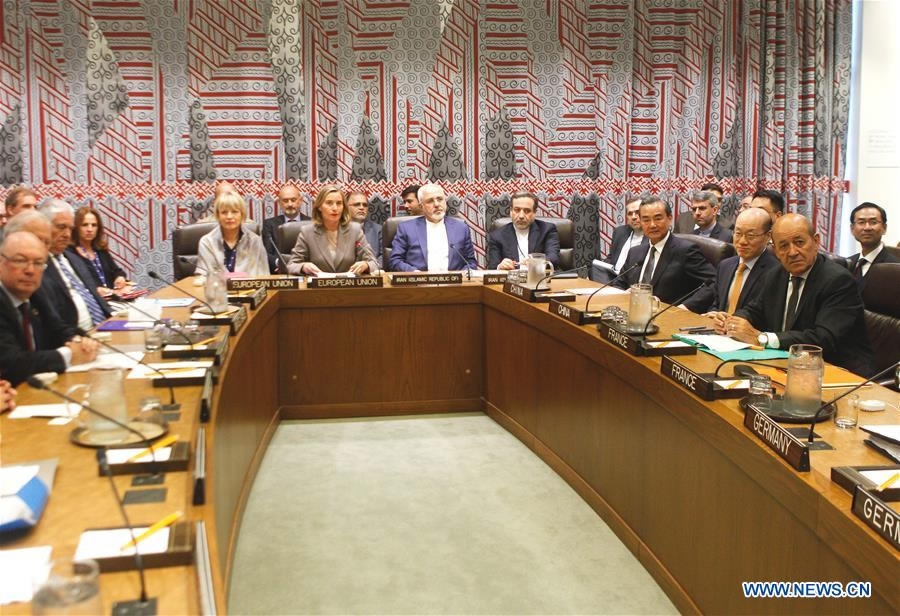
Chinese Foreign Minister Wang Yi (3rd R, front) participates in a meeting between the foreign ministers of the six world powers of Britain, China, France, Germany, Russia and the United States, and Iran at the UN headquarters in New York, on September 20, 2017. /Xinhua Photo
Chinese Foreign Minister Wang Yi (3rd R, front) participates in a meeting between the foreign ministers of the six world powers of Britain, China, France, Germany, Russia and the United States, and Iran at the UN headquarters in New York, on September 20, 2017. /Xinhua Photo
He expressed hope that all parties would focus more on the benefits of the deal, noting that no agreement is perfect.
China's ambassador to Iran Pang Sen also emphasized that other signatories all oppose renegotiation of the 2015 deal.
The EU countries that signed up to the deal have spoken forcefully about saving it. French President Emmanuel Macron explicitly stated at the UN General Assembly that "this agreement will not be renegotiated."
"Renouncing it would be a grave error, not respecting it would be irresponsible, because it is a good accord that is essential to peace at a time where the risk of an infernal conflagration cannot be excluded," he added.
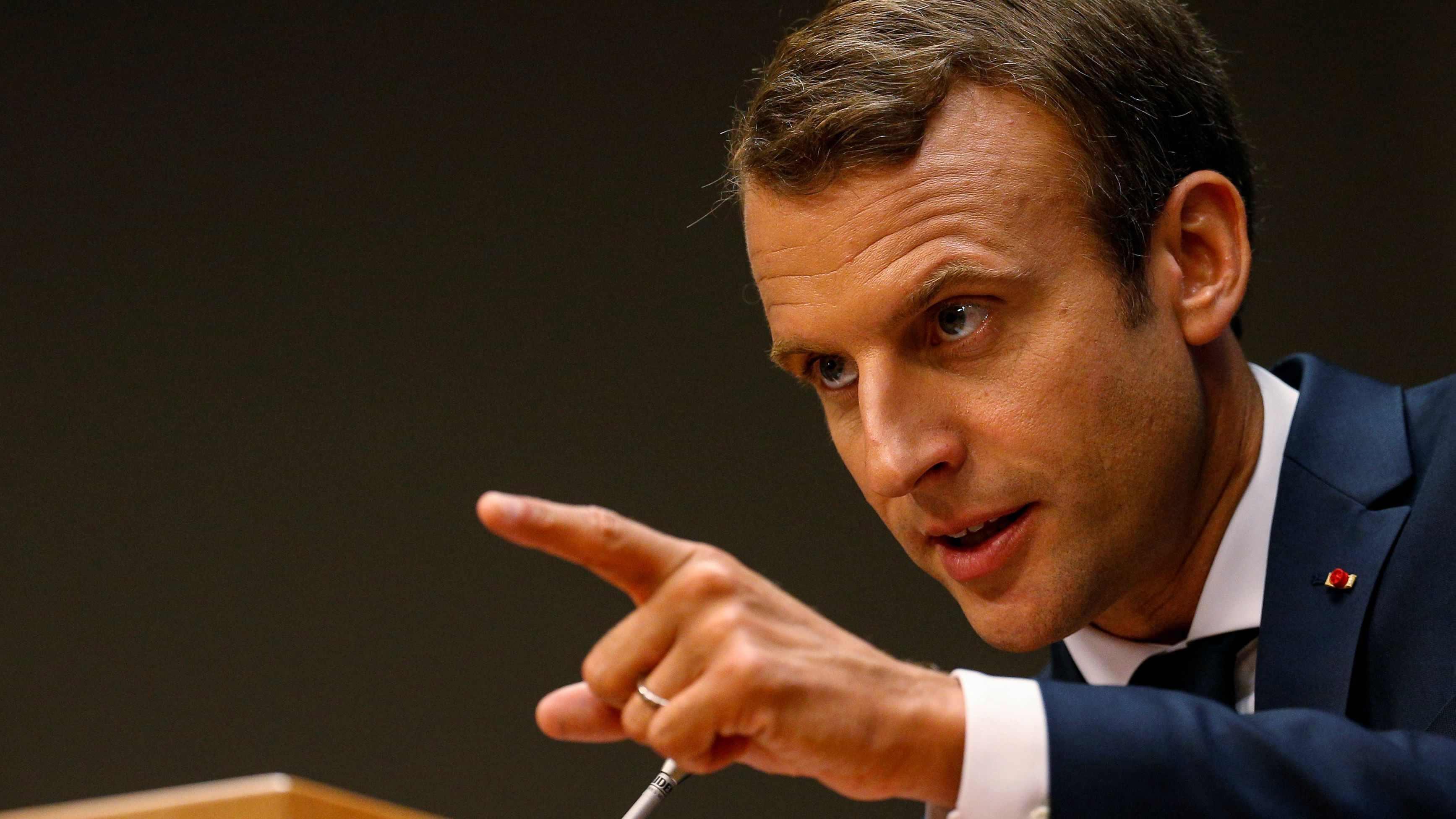
French President Emmanuel Macron speaks during a press conference on the sidelines of the 72nd United Nations General Assembly at UN headquarters in New York, US, on September 19, 2017. /Reuters Photo
French President Emmanuel Macron speaks during a press conference on the sidelines of the 72nd United Nations General Assembly at UN headquarters in New York, US, on September 19, 2017. /Reuters Photo
Theresa May, the UK prime minister, reaffirmed her country’s commitment to the deal in a phone call with Trump on October 10, saying it was vital for regional security.
German Foreign Minister Sigmar Gabriel said US opposition on the Iran issue will only "drive us Europeans into a common position with Russia and China against the USA."
Russia’s UN ambassador, Vassily Nebenzia, said Moscow’s message to the US was to stay in the deal. "That is not only our message, but the rest of the participants and those that are outside are trying to send this message across," Nebenzia told reporters.
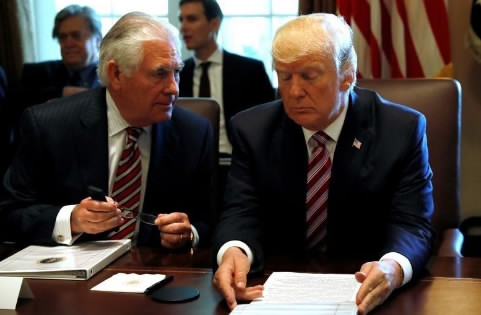
US President Donald Trump talks with Secretary of State Rex Tillerson during a meeting with members of his Cabinet at the White House in Washington, US, on June 12, 2017. /Reuters Photo
US President Donald Trump talks with Secretary of State Rex Tillerson during a meeting with members of his Cabinet at the White House in Washington, US, on June 12, 2017. /Reuters Photo
US State Department spokeswoman Heather Nauert told reporters that Tillerson had discussed Trump’s plan with the French and Russian foreign ministers as well as Chinese State Councilor Yang Jiechi on Thursday, and with British Foreign Secretary Boris Johnson "in recent days."

